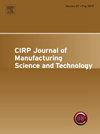用信心减少热误差:精密机床的不确定性补偿
IF 5.4
2区 工程技术
Q2 ENGINEERING, MANUFACTURING
CIRP Journal of Manufacturing Science and Technology
Pub Date : 2025-07-16
DOI:10.1016/j.cirpj.2025.06.001
引用次数: 0
摘要
本文提出了一种新的精密机床热误差概率补偿方法。该方法的基础是高斯过程回归(GPR)模型,并结合预测标准差的阈值。GPR模型的主要优势在于它不仅为预测提供了点估计,而且量化了与每次预测相关的不确定性。此外,GPR将热误差预测和热关键点选择结合到一个模型中,大大降低了整体模型的复杂性。采用近年来发展起来的扭矩极限跳跃(TLS)热误差测量方法对精密机床的热误差进行了测量。当超过应用的阈值时,模型使用先前测量的温度和用TLS函数测量的热误差值触发重新校准反馈回路。结果表明,自校正补偿模型显著降低了机床的热误差。本文章由计算机程序翻译,如有差异,请以英文原文为准。
Reducing thermal errors with confidence: Uncertainty-based compensation for precision machine tools
This work presents a new probabilistic method for the compensation of thermal errors of precision machine tools. The basis of the proposed method is the Gaussian Process Regression (GPR) model combined with a threshold for the predicted standard deviation. The key advantage of the GPR model is that it not only provides point estimates for predictions but also quantifies the uncertainty associated with each prediction. Additionally, GPR combines the thermal error prediction and thermal key point selection into a single model, which considerably reduces the overall model complexity. Thermal errors are measured with the recently developed torque limit skip (TLS) thermal error measurement method for precision machine tools. When the applied threshold is exceeded, the model triggers a recalibration feedback loop using previously measured temperature and thermal error values measured with the TLS function. Results show that the self-recalibrating compensation model significantly reduces the thermal errors of the investigated machine tool.
求助全文
通过发布文献求助,成功后即可免费获取论文全文。
去求助
来源期刊

CIRP Journal of Manufacturing Science and Technology
Engineering-Industrial and Manufacturing Engineering
CiteScore
9.10
自引率
6.20%
发文量
166
审稿时长
63 days
期刊介绍:
The CIRP Journal of Manufacturing Science and Technology (CIRP-JMST) publishes fundamental papers on manufacturing processes, production equipment and automation, product design, manufacturing systems and production organisations up to the level of the production networks, including all the related technical, human and economic factors. Preference is given to contributions describing research results whose feasibility has been demonstrated either in a laboratory or in the industrial praxis. Case studies and review papers on specific issues in manufacturing science and technology are equally encouraged.
 求助内容:
求助内容: 应助结果提醒方式:
应助结果提醒方式:


